GitHub: Open Source Projects Risk Dying Without More Funding
At the State of Open Con event, GitHub’s Kara Sowles warns that current open source funding methods are ‘not sustainable’

At a Glance
- Developers of open source models are often working without getting paid and 58% considered stopping, a GitHub manager said.
- Without more funding, especially from companies, open source projects will wither, she said at the State of Open Con event.
Open source developers are building innovative software and generative AI solutions as alternatives to proprietary, closed models. But since many are not getting paid for the work, this wave of open source projects could be in jeopardy..
That is according to Kara Sowles, a senior open source program manager of developer relations who spoke today at the State of Open Con in London. She said that 58% of developers have at least considered quitting a project and 22% have quit.
She also said that 56% of open source contributors would keep working if they were given more money.
Another problem is that 60% of users who are maintaining open source software projects – so-called maintainers’ − are hobbyists merely doing it because of passion for the work.
‘Embarrassing’ levels of company investments
When there is funding for open source, Sowles said it was not coming from big-name companies. Rather, individuals are donating more on GitHub than companies, which she said is “very embarrassing.”
However, this crowdsourcing is not consistent and relying on it “is not going to work,” Sowles said, adding, “We need more companies publicly committed to funding.”
There are several ways to donate to open source projects, from tipping tools like Buy Me a Coffee to crowdfunding solutions like Kickstarter, but the main way companies donate to open source software projects is through Free and Open Source Software (FOSS) Funds.
These are where companies launch a program framework to subsidize open source projects. First popularized by recruitment platform Indeed, the likes of Salesforce, Microsoft, Spotify and Bloomberg have all followed suit.
But in 2023, just $12 million went through FOSS Funds, which Sowles described as “not a lot.”
There was a huge drop in FOSS Fund spending last year, with global economic issues impacting whether companies were willing to part with their cash. “2023 was a reminder that corporate budgets and priorities are fickle,” she added.
The practice of FOSS Funds, in their current form, are “not contributing to stable or predictable funding,” Sowles said.
“A majority of FOSS funds give one-time amounts. … You cannot plan your project’s budget on hoping you get a FOSS cash.”
How to improve open source funding
According to Sowles, 90% of companies make use of open source software solutions. Without adequate funds, valuable resources could disappear.
GitHub predicts that with an additional 10% of contributions to open source software projects, it could generate an additional 0.4% to 0.6% increase to Europe’s GDP, she said.
Some companies were reluctant to admit to spending on open source projects, but the ones that did “made a difference and continue to make a difference,” she added.
Sowles called for more companies to raise awareness by committing publicly to this method of funding. She mentioned Fossfunders, which is building a list of companies open to committing to help these projects.
To further increase funding of open source projects, Sowles stressed the need for more data, especially on how funds actually impact a project’s efforts. Also needed is more data for identifying dependencies so investors are not “relying on charisma to choose who gets funded.”
Sowles also called for more information and advocacy to arise from government funding through bodies like OpenUK.
Read more about:
Conference NewsAbout the Author(s)
You May Also Like


.jpg?width=700&auto=webp&quality=80&disable=upscale)
.jpg?width=700&auto=webp&quality=80&disable=upscale)
.jpg?width=700&auto=webp&quality=80&disable=upscale)
.jpg?width=300&auto=webp&quality=80&disable=upscale)
.jpg?width=300&auto=webp&quality=80&disable=upscale)
.jpg?width=300&auto=webp&quality=80&disable=upscale)

.jpg?width=300&auto=webp&quality=80&disable=upscale)